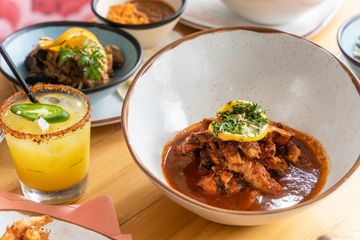Satisfy your cravings with take out and delivery from the most-loved Mexican restaurants near you
Is Mexican Food Healthy? Unboxing the Nutritional Advantages of Typical Components
The inquiry of whether Mexican food is healthy welcomes an exploration of its typical components. Beans and corn work as foundational staples, abundant in protein and fiber. Avocados provide beneficial fats, while numerous herbs and flavors add taste and wellness benefits - hand crafted margarita. With each other, these elements develop a tapestry of nutrition. Nevertheless, the healthiness of Mexican food commonly depends on preparation approaches and portion sizes. What function do these elements play in establishing its total nutritional value?
The Power of Beans: Protein and Fiber-Rich Staples
Although usually neglected, beans act as a keystone of Mexican food, offering a wealth of nutritional benefits. Rich in protein, they are an exceptional plant-based choice for those looking for to fulfill their nutritional healthy protein requires. This high healthy protein content supports muscle repair work and growth, making beans vital for both vegetarians and meat-eaters alike. Furthermore, beans are an exceptional source of dietary fiber, which aids in digestion and promotes a sensation of volume, possibly assisting with weight management.
The variety of beans utilized in Mexican meals, such as black beans, pinto beans, and kidney beans, adds to a diverse taste account and can improve meals nutritionally. Beans are low in fat and contain essential vitamins and minerals, consisting of magnesium, iron, and folate. With each other, these characteristics make beans an essential ingredient, supplying both nutrients and nourishment in traditional Mexican price.

Corn: a Versatile Grain With Nutritional Advantages
Corn attracts attention as a flexible grain essential to Mexican food, celebrated not just for its cooking applications yet also for its outstanding nutritional profile. As a key ingredient in meals like tortillas, tamales, and pozole, corn offers vital nutrients that contribute to a well balanced diet. Rich in carbs, it functions as a considerable power resource, while also being reduced in fat, making it a favorable option for different dietary demands.
Furthermore, corn is an excellent source of dietary fiber, which assists in food digestion and advertises satiety. It includes significant quantities of vitamins such as B-complex vitamins, which are important for basal metabolism. The visibility of anti-oxidants, particularly carotenoids, adds to overall wellness by lowering oxidative anxiety. Furthermore, corn is gluten-free, dealing with those with gluten level of sensitivities. Generally, the nutritional advantages of corn highlight its importance in standard Mexican food and its function in a healthy and balanced diet regimen.
Avocados: Healthy Fats and Nutrients in Every Bite
Avocados play a substantial function in Mexican cuisine, matching meals with their velvety appearance and abundant flavor. Past their cooking charm, avocados are commemorated for their excellent dietary profile. They are a rich source of healthy monounsaturated fats, which can assist lower bad cholesterol degrees and assistance heart health. In addition, avocados are loaded with important minerals and vitamins, including potassium, vitamin E, and B vitamins, adding to total wellness.
The high fiber content in avocados aids food digestion and advertises satiety, making them a helpful enhancement to any kind of dish. Their unique nutrient make-up can also support skin health and give anti-inflammatory advantages. Integrating avocados into standard Mexican meals or appreciating them as a standalone treat can boost both taste and nutrition, demonstrating why they are a precious staple in Mexican food. Generally, avocados provide a delicious means to take pleasure in healthy fats and important nutrients in every bite.

Flavors and Herbs: Flavorful Health Boosters
While enjoying the abundant tastes of Mexican food, one can not ignore the crucial function that spices and natural herbs play in boosting both taste and health. Components such as oregano, cilantro, and chili peppers not just contribute to the lively taste account find out but also give substantial health benefits. For circumstances, cilantro is recognized for its detoxing buildings, helping to remove heavy metals from the body, while oregano is loaded with antioxidants and possesses anti-inflammatory effects.
Chili peppers, a staple in lots of Mexican recipes, consist of capsaicin, which has actually been linked to boosted metabolism and pain relief. Furthermore, seasonings like cumin and coriander assistance digestion and may help in blood sugar guideline. Integrating these savory health boosters into dishes not just boosts the culinary experience however additionally advertises general health, making Mexican cuisine not just scrumptious, but likewise nutritionally advantageous.
Traditional Cooking Techniques: Enhancing Nutrition and Flavor
Conventional cooking techniques in Mexican food play a crucial role in improving both nutrition and taste, as they usually focus on classic methods and fresh active ingredients. Methods such as nixtamalization, where corn is soaked and prepared in an alkaline service, not just enhance the go to the website nutrient account of tortillas however likewise boost their digestibility - churros. Additionally, the usage of slow cooking methods, like stewing or braising, allows tastes to combine perfectly while preserving the stability of the active ingredients

Regularly Asked Questions
Are Mexican Food Portions Normally Larger Than Other Foods?
Mexican food portions are typically bigger than those of several various other foods. This characteristic reflects conventional dining practices, highlighting public sharing and hearty meals, which can result in a more considerable offering dimension in general.
Exactly how Does the Prep Work Approach Affect Healthiness of Mexican Food?
Prep work techniques significantly affect the healthiness of Mexican food. Methods such as cooking or steaming protect nutrients, while frying can boost undesirable fat web content. Options of go to these guys ingredients and cooking designs inevitably determine overall dietary worth.
Can Mexican Food Be Tailored for Details Nutritional Limitations?
Mexican food can undoubtedly be tailored for details nutritional constraints. Substitutions, such as utilizing corn tortillas for gluten-free diets or incorporating more vegetables, make it possible for people to enjoy conventional tastes while accommodating numerous nutritional demands.
What Prevail False Impressions Concerning Mexican Food and Health And Wellness?
Typical misunderstandings about Mexican food consist of the belief that it is naturally undesirable, overly zesty, and solely concentrated on fats. In reality, conventional recipes frequently feature healthy ingredients and can be tailored to various dietary demands.
Exist Much Healthier Alternatives at Mexican Restaurants?
Much healthier options at Mexican dining establishments typically consist of barbequed meats, beans, and fresh vegetables. Picking meals that emphasize whole components and staying clear of hefty sauces can lead to a more nutritious eating experience, advertising general wellness.
The range of beans utilized in Mexican recipes, such as black beans, pinto beans, and kidney beans, contributes to a diverse taste profile and can enhance dishes nutritionally. Avocados play a substantial function in Mexican food, complementing recipes with their creamy structure and rich flavor. Integrating avocados right into typical Mexican recipes or appreciating them as a standalone snack can boost both flavor and nutrition, demonstrating why they are a precious staple in Mexican cuisine. While appreciating the rich tastes of Mexican cuisine, one can not forget the vital role that spices and herbs play in enhancing both taste and health. Conventional cooking techniques in Mexican food play a vital function in improving both nutrition and taste, as they often focus on time-honored techniques and fresh ingredients.